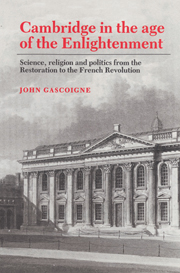 Cambridge in the Age of the Enlightenment
Cambridge in the Age of the Enlightenment Book contents
- Frontmatter
- Contents
- Acknowledgements
- Abbreviations
- Note
- Introduction
- PART ONE THE ‘HOLY ALLIANCE’ IN GESTATION, 1660–88
- 1 Restoration, religion and reaction
- 2 Cambridge and the latitude-men
- 3 Restoration Cambridge and the ‘new philosophy’
- PART TWO THE ‘HOLY ALLIANCE’ PROCLAIMED, 1689–1768
- PART THREE THE ‘HOLY ALLIANCE’ QUESTIONED, 1769–1800
- Epilogue
- Bibliography
- Index
1 - Restoration, religion and reaction
Published online by Cambridge University Press: 24 August 2009
- Frontmatter
- Contents
- Acknowledgements
- Abbreviations
- Note
- Introduction
- PART ONE THE ‘HOLY ALLIANCE’ IN GESTATION, 1660–88
- 1 Restoration, religion and reaction
- 2 Cambridge and the latitude-men
- 3 Restoration Cambridge and the ‘new philosophy’
- PART TWO THE ‘HOLY ALLIANCE’ PROCLAIMED, 1689–1768
- PART THREE THE ‘HOLY ALLIANCE’ QUESTIONED, 1769–1800
- Epilogue
- Bibliography
- Index
Summary
Oxford's reputation has never quite recovered from Matthew Arnold's description of his beloved alma mater as a ‘home of lost causes and forsaken beliefs, and unpopular names and impossible loyalties’ (Arnold, 1962 ed.: 290). While in popular stereotype Oxford is associated with such movements as the Laudians, the jacobites and the tractarians, Cambridge, by contrast, is seen as the home of more radical and reformist creeds: the puritans, the Cambridge Platonists and the broad churchmen. Consequently, we are predisposed to think it unremarkable that Cambridge proved to be fertile ground for the growth of latitudinarianism – a variety of theology which sought to minimise doctrinal discord by emphasising the role of natural rather than revealed theology and which therefore placed considerable emphasis on the apologetical uses of the ‘new philosophy’.
Yet Restoration Cambridge was at least as wedded as Oxford to traditional ideals which left only limited room for theological experimentation or, indeed, to intellectual innovation more generally. At the Restoration, Cambridge's royalist credentials were far less noteworthy than those of its sister university. Oxford had been the university of Laud, the former headquarters of the King, and it had surrendered to the parliamentary forces only after a long and stubborn siege.
- Type
- Chapter
- Information
- Cambridge in the Age of the EnlightenmentScience, Religion and Politics from the Restoration to the French Revolution, pp. 27 - 39Publisher: Cambridge University PressPrint publication year: 1989


